How To Create A High Fantasy Politics Reference Doc (with A Template And Guide!)
how to create a high fantasy politics reference doc (with a template and guide!)
political fantasy is an extremely fun genre to write in, that is, until you have to actually write the politics. in this semi-requested guide, i'm going to explain to you how i virgo-planned my way to a horribly detailed—though also horribly helpful—political reference doc for my one and only wip, a treatise of tyrants and thieves.
if you too would like to use a similar format to what i did (though consequently you will have to change it to fit your own worldbuilding), i have a template for dropbox paper right here.
as a sidenote, i do recommend already having built up a decent amount of your world before jumping into this; this document is meant to help flesh out pre-existing content in such a way that is really hard to do with a wip that's just starting out.


setting up.
Generally speaking, when I first began writing this doc, I was mostly doing so in relation to the government of the country wherein my WIP takes place and its relationship with other countries (or nations!), with its own people, and within itself. This then lead to my three, aptly-named subcategories; External, Internal, and Personal Relations (I'm very creative as you can see.)
These three subcategories became my main headers, and all of my organization took place within a Dropbox Paper doc—as I am partial to the cleaner interface and very easy creation of a table of contents—but using Word or Google Docs works just as well. With that, and a lot of pain and suffering in the form of preexisting worldbuilding, I started to flesh all the info out.
You should note that the country AToTaT takes place in a country called Vsyhna (vuh-sen-uh) and its government is referred to as the Dual Courts. This is also a forewarning, for the fact that I will probably be talking about my own worldbuilding quite a bit, if not only for purposes of giving proper examples!
So without any more notes from me, let's properly jump into this thing.

external relations.
The external relations between the Dual Courts and all the other governments within Ashvayr (the continent that Vsyhna is a part of), of which there are eleven, can be described in one of the following ways:
✅ = Allies
⚠️ = Allied by treaty, with tensions
❎ = Not allied, but no real tensions
✴️ = Not allied, but with tensions
⛔️ = Enemies
All of these relations should be taken with a grain of salt, and also adapted to fit your worldbuilding, of course, but as a general consensus, most governments will have one of those relationships with another. The emojis are used so that it's easily identifiable (I'm also insane, let's not forget), but emojis don't replace discussion.
Within each section, I discussed the relationship between these governments but also gave a quick list of bullet points that explained important moments in recent history that have created those tensions—or lack thereof—the current political state in each country, certain cultural tidbits, and cultural differences between Vsyhnians and others.
Generally, this isn't the stuff you want to get lazy with, and while it is fine to say something like "Oh they live across the world my mc's won't know this." It's better to have the ability to even subtly suggest other people, cultures, or ideologies. It deepens your world, and more than this, can be super interesting to readers. You should also note that this information should affect your characters in some way, otherwise the politics are going to be very boring (as they don't relate to anyone.)
This alternated between something as complex as gender politics, to things as simple as cuisine or trade goods. Indeed, you don't have to cover every base with these descriptions, arguably, this is the part you should spend the least amount of time on (unless you're braver than a U.S. marine and do, in fact, wish to take on international relations), but you should cover every important base.
For a slightly more simple example, let's look at the Empire of Sansryn. I wrote: "The Empire of Sansryn ⚠️ is an archipelago that is composed of two main ethnic groups; the Sansrynians, who occupy the northern half of the islands, and the Tarimese, who occupy the southern half of the islands." Then continued to briefly describe the relationship between Sansryn and Tarim.
The next two paragraphs were designated to a) their relationship with Vsyhna (which as you can see with the ⚠️ emoji is not great) and b) their relationship with other countries around them, not forgetting why it's so poor in the first place, which, spoiler, has to do with a number of social issues.
Also in the case of Sansryn, one of my side characters is half Sansrynian, which is something I noted mostly for the purposes of clarifying this character's relationship with this part of their identity and culture.
Realism is, quite frankly, optional in fantasy (or rather, you define what "real" actually means) but I do tend to strive for realism within AToTaT's politics, if not only because it's fun. When delving into (rightfully!) complex issues—like ethnic conflict for example—it's necessary to do your homework (and hire sensitivity readers afterward) if it's not a topic you are familiar with or related to. However, that exact process is not something I will be discussing in this post and I encourage you to do your own research.
You also want to take into consideration how these countries are related to each other. For me personally, I almost exclusively did this for the two current conflicts (i.e. actively disputed treaties, current armed conflicts) within the world, but I did briefly touch on how those relationships came to be, as you can see above.

internal relations.
Internal relations is where things start to get more complex and also more specific to the world my WIP takes place in. For this section, you need to have already realized a great deal in regards to major political institutions (if you have them!) and most importantly, cultural attitudes.
I split my internal relations section into seven sub-sections, which included: Social Cleavages, Justice System, Garrison, Navy, Cults vs. Church, Crime, and Trade.
For a Wikipedia definition, a social cleavage is "a historically determined social or cultural line which divides citizens within a society into groups with differing political interests, resulting in political conflict among these groups." AKA sexy, sexy plot tension.
The social cleavages of Vsyhna mostly revolve around social class (in-world called "rank"), an urban/rural divide, and nationality, which I note as being "considerably not a social cleavage." It appears I should have listened to my Wikipedia-defined advice. That said, rank was described at length for its importance to the religion, general structure within government, linguistic flavor (dialects!), and laws. It's one of my largest social themes and connects to almost everything within the book, including the magic system.
Speaking of magic, as I didn't mention it within my seven sub-categories above, I should note that however magic works in your society should also be included. In my case, it's heavily intertwined with religion and social class (access to the information that allows people to use magic, I mean) and so I didn't feel the need to clarify its role with an entirely new section, but how you do this is entirely up to you. It's also up to you to include a magic system, as in reality, you don't necessarily need one. I also have a completely separate Dropbox doc for most of these things anyway (re:knowing stuff before you jump into this.)
The justice system is something I find is often not immediately thought about when it comes to fantasy, but from a very general point of view, this also encompasses subjects such as law codes, the punishment for breaking those codes, and what trials look like, if you have them. This can tell us much about your culture, what they value, and more importantly, how much they value it.
For example, continuing with my themes of classism, sumptuary laws are a large part of Vsyhnian society, i.e. laws that forbid the usage of certain goods to lower classes. Given that it's illegal for someone of lowborn status to have, let's say silk, it creates a) a prime criminal market (trading "illegal" goods), b) a need to crack down on this market, and c) further severs the relationship between upper and lower classes, given that the fairness of the justice system is then put under scrutiny. Indeed, the fact that it's the Church that controls the justice system, you have a similar tension in the department of faith, and I haven't even begun to talk about how the treatment during trials differs.
I often find military to be the greatest emphasis within quite a lot of political fantasy, that being, the mobility of large land armies or prowess at sea. For me personally, I find this to be rather boring (both on accounts of reading and writing) so I did come at this with a lens of interest in the personal relationships of these people and actual organization within the military. Mostly, I used what I knew from external relationships and current conflicts to create something that could be used later on if I needed it, as it's not heavily featured (at least not in the first book!) Treaties, blockades, relationships between commanding officers, and relationships with piracy.
On notes of realism, I went with the very classic These Island People Have A Great Navy, as, historically, they tend to.
We should all know by now how important religion, or lack thereof, is in epic fantasy, and while I could go on about this for several hours, this is a political relations doc, so I focussed on the tension between sects of the main religion. How different leaders within the religion interacted with other members of government is a topic for personal relations, however, if not only because they're heavily featured, and there are several (about nine actual descriptions.)
This culminated by way of cults vs. the Church, differing ideologies within fundamental concepts of the religion, and generally how they're seen by Vsyhnian society (and—you guessed it—social class.) As an example, I wrote, "All of these organizations consider the Holy Book Rovnokh to be canon and true within their faiths, though it is the Codex Drkha that is often disputed in validity. This is the result of their own written dogma, which may convey entirely different personalities and oblation tales, or emphasis on a very specific aspect of the mortal godchild then how they are presented in the Codex."
It is important to consider, before even delving into differences, what the fundamentals of each sect or division within your religion are speaking on. Think of the historical context that may have brought about such a concept, or even fuzzy lines within canon texts. Here's another example, "The seventh mortal godchild is not mentioned within the Codex and therefore not considered a valid mortal godchild, though Vrah’s appearance in the Holy Book and the Children of the Bone’s own text—which are older than the Codex—say otherwise. 'Vrah' is more used as a term to describe magic and not at all a person, when it is mentioned in the Codex."
Crime and trade, as you can imagine in a society plagued by rules that dictate trade—and in many cases make the trade of certain items a crime—is quite important. As I hinted earlier in the justice system section, the "illegal" trade of certain goods, which goes against sumptuary laws. That said, crime happens for a number of different reasons, and I took the time here to think about partner organizations, illegal magic producers, and gangs.
Crime can actually be an excellent tool of worldbuilding, if not only for the fact that it is so specific to the country and history it resides in. Why does something need to be stolen? Fabricated? Spied on? And who is getting the most out of it?

Trade was something I rather lazily did with the above Vsyhnian roadmap—I don't plan on discussing economics at all, nor following merchants as they move goods though the country.
I want to note once more that all of this is extremely relative information; what you need to write about to create political tension is entirely up to you and your story. As a general bit of advice, however, it is helpful to ensure that everything can come back around to your characters—if not now, then at some point within the series or story as a whole. Politics can become boring very easily, especially when not personal.

personal relations.
For our final and most interesting section, I did two, somewhat important things before actually writing anything out; that being creating two charts. The first is a political alignment chart, the second is a chart that defines the different positions of government. While again, this is totally relative, this is what I came up with:

Take the time to think about and research other forms of government, what each "branch" might do, and how they do it. More importantly though, think about how the culture and religion would, can, or do influence the government, and how the government has responded to such action. Look to history especially!
The charts allowed me to very easily place my main characters, their families, and all the previous groups of people (gangs, cults, social classes) into categories that can then, more or less, directly define their relationships with one another. This made the process that I will now describe to you a little less tedious.
I divided this category into three sections: Nobleborn Houses (that being houses of great import and high rank), the Prelacy (leaders of the Church), and Others of Note.
There are ten nobleborn houses, however, I only did mass amounts of details for five of the most important. I should also note that two of my four main characters are a part of two of these houses, and it's for that reason that I felt I needed to be as in-depth as possible. For Houses, the organization went something like this:
House Name:
A general description of the house, its history, and how it rose to power, as well as what they generally control within the government or country and how long they've had this position.
Try to be as diverse as possible within these descriptions—cover a lot of different bases and don't be afraid to do it! A family rising to power as a result of the money they, for example, gained from growing roses says a lot about the culture and commerce of a particular country.
Public Opinion:
What the people think of this family, given all social standings and occupations. Naturally, when I say all, I don't mean think about what every carpenter thinks of the royal family, I just made sure it was a general consensus!
Opinion of the Other Five Houses:
This, I tended to keep as short as possible, but like the external relations above, I wanted to know what and how the relationship was what it was. For several, I already had an idea, but for...so many more I did not (hear the pain in my voice? there's pain in my voice.)
Opinion of the Remaining Houses:
Shorter than even short as possible, but the same idea as before.
Main Members:
Probably one of the more important sections; I listed out all the members of the main part of the family, that is, the immediate family of the person involved in government (or main character.) This not only defines your side characters—of which there are bound to be many—but also clarifies the conflicting motives of the people in charge. And they should conflict, hopefully with the motives of your main characters. Extended family was discussed when important, such as prominent aunts, uncles, or grandparents, but for sake of simplicity, lengthy descriptions were kept for parents and children.
I also included charts after this about minor houses sworn to these noble houses, but to be completely honest, I didn't fill out most. That said, I did repeat this process for all five houses, and the good news, is that after you talk about the relationship with one of the other five, you're done completely, so, yay one less bullet point each time. Also, don't feel pressured to have a name for everyone or everything! In fact, I mostly skip over names of people unless I really have to know them in text, far more characters are simply [BROTHER] or [PARENT], though this could be a laziness thing. Or a conlang one.
A worldbuilding note: I also included house colors, sigils, and heads in this instance, as well as their connection to certain magical oaths.
For the remaining five nobleborn houses, I only listed house heads, sigils, and colors, if not only because I described their relationship with everyone else, earlier. That said, I also included house heir and extra notes, if I needed them.
The Prelacy was organized slightly differently, as important members of the Church, they don't necessarily have family members interacting with them. Instead, I focussed on backstories, their relationships with the Arkan (the monarch, sort of), and once more, motive (and personalities, given that I don't give side characters a full oc profile.)
As shown in the chart above, there is one High Vokhsv and six Vokhvs that work under them; the former had a more in-depth section of text, however, the six got just about as much detail as the lesser five noble houses.
My last and final section was short and sweet (thank God) and covered two topics very briefly, that are so world-specific I won't even bother explaining them. That said! That's what this section is for; anything else that you might have missed.
I won't lie, the personal relations section was probably the most time-consuming part of this entire doc, but in the end, it did pay off. The entire thing took about from the 22nd of February to the 18th of April, and came out to around 30k. Do I suggest you also write this much? Not unless you feel like you need it. I don't really plan out plot, so for me, this was my plan, hence the length and detail.
Thank you so much for reading! I hope you enjoyed this far too long breakdown of my political reference doc of my WIP, A Treatise of Tyrants and Thieves and good luck with your own process, writing, and research <3

references.
Some links I found helpful:
The template link, once more ($1).
Brandon Sanderson's 2020 creative writing lectures (YouTube)
Designing a fantasy legal system (Worldbuilding Stack Exchange)
Unpacking Folk Tales/Motif Index (Uni. of Alberta)
Real Inequality in Europe since 1500 (Journal, PDF)
Diplomacy (Wikipedia)
Public Diplomacy in Early Modern Europe (Journal)
The Spy Chiefs or Renaissance Venice: Intelligence Leadership in the Early Modern World (Oxford Brookes Uni., PDF)
Branches of the U.S. military (SOU)
those who were interested.
@chovansjtsjina @zielenheil @lord-fallen @ninazeniks @viesceral @introverteddumbass @wisteria-eventide & anyone else, feel free to reply, send an ask, or dm me about questions!
More Posts from Lune-versatile and Others
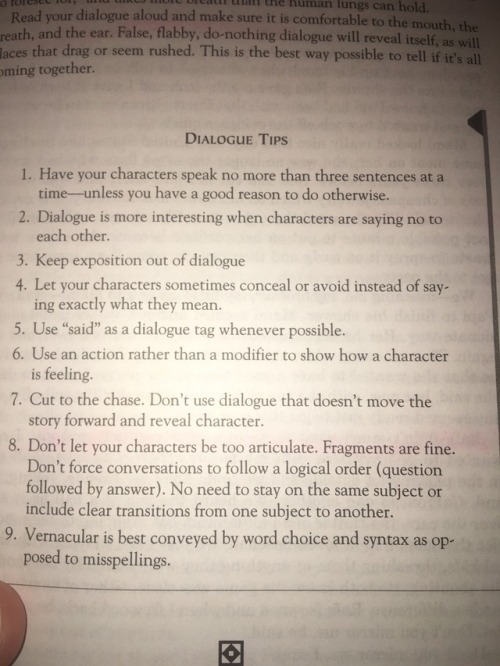
So I just started my short story writing class! These are dialogue tips from Janet Burroway’s Writing Fiction: A Guide to Narrative Craft


Your narrator and each of your characters should sound different from one another (unless your story is in the first person and one of the characters is actually telling the story!). Remember that no two people speak in exactly the same way, so if all your characters sound identical to your narrator, it will pull the reader out of the story.

Every person has distinct vocal habits or “go-to’s,” words or phrases they use often, and giving your characters their own vocal “go-to’s” can help lend them some realism and make it easier to tell them apart from one another. Here’s a little hint: we use these “go-to’s” even more often when we’re distracted or not fully paying attention to the conversation and what we’re saying.

People sometimes stumble over their words. Let your characters stutter, or repeat themselves, or forget what they were about to say, or even ramble sometimes, especially if they are feeling flustered or overwhelmed in the scene. This will add realism to your dialogue, and make your characters seem more real to your readers!

Just like in real life, the situation should affect how your character speaks. For example, if a character has just gotten a big, unpleasant surprise, they probably won’t be in the right frame of mind to make a calm, articulate speech. Think about what’s happening and how it will affect what your character says and the way that they say it.

Most people speak differently depending on who they are talking to. For example, you probably wouldn’t talk to your boss the same way you would talk to a friend! Think about your character’s relationship to the person they’re talking to, and how they feel about that person, and let that come out in their dialogue.

Descriptive verbs (like “exclaimed” or “demanded” instead of “said”) are a great way to breathe some life into your dialogue, because they give the reader more information, telling us not just what the character said but how they said it. On the other hand, when used too often, or incorrectly, descriptive verbs can pull the reader right out of the story (for example, using “demanded” when the character isn’t making any kind of demand in their dialogue).
For all you worldbuilders out there, I don't know if you know, but r/worldbuilding on Reddit made this Google Doc with a ton of resources they gathered. Thought that might help some of you.

The Top 10 Writing Posts From June 2021
Every month, we look at the posts that people read the most.
These were the new Writers Write posts you enjoyed in June 2021:
30 Writing Prompts For June 2021
A Quick-Start Guide For Creating Characters
On Ghosts & How To Write About Them
The Way Of The One – For Writers
14 Boring Expressions & What to Use Instead
How Much Sex Do You Need In A Sex Scene?
The Notorious ‘You’ – An In-Depth Look At Second Person
What Is Imagination & Why Is It Important For Fiction Writing?
The Unintended Consequences Of A Lack Of Setting
7 Writing Observations From Ian McEwan
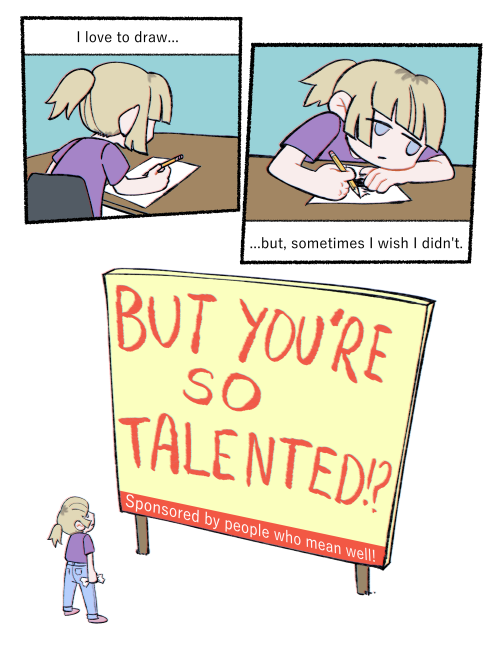
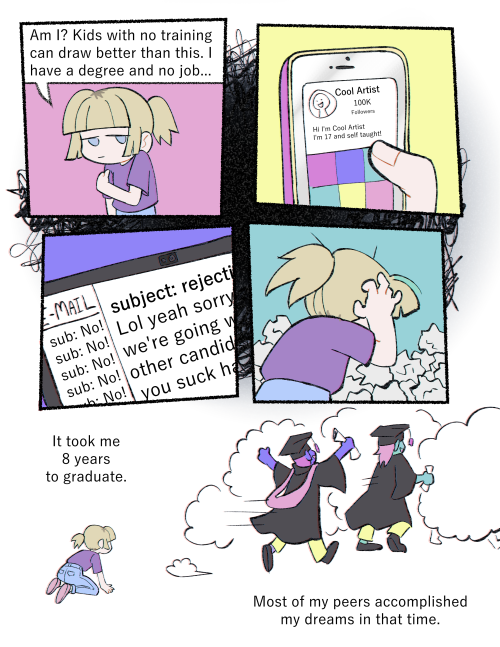

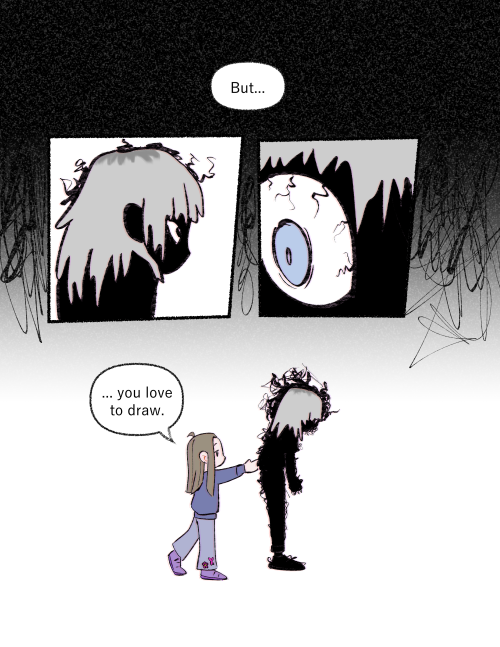
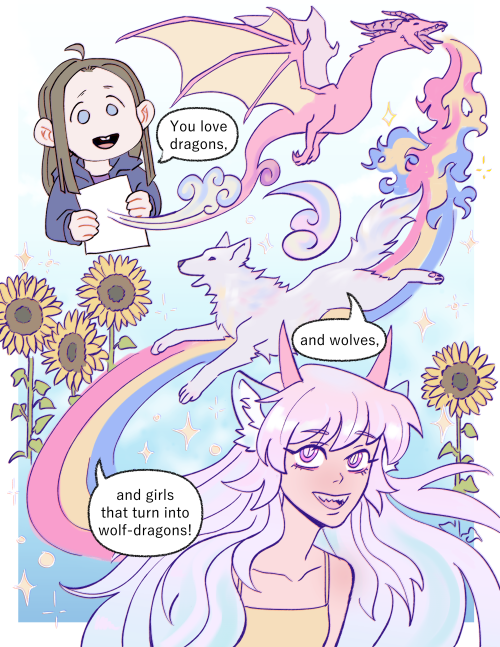
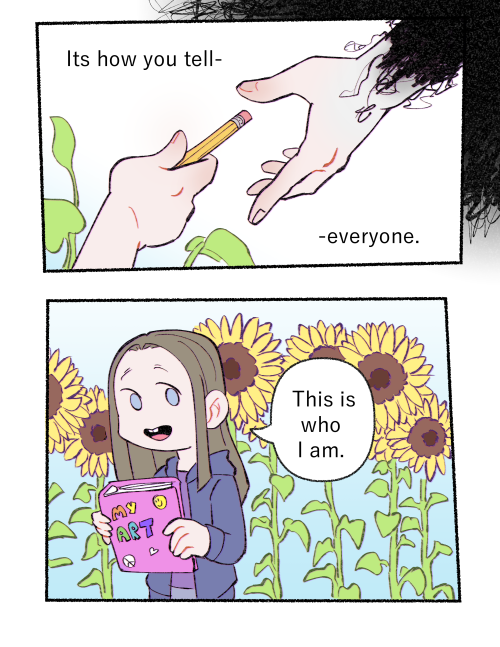

A comic to try and sort through some difficult feelings about being an artist and a reminder to not forget who you are.
Can you hear your characters?
I have a whole lot of trouble making my dialogue sound natural if I don’t know what my characters sound like. Having a strong sense of their voice can help distinguish your characters from each other, show their personalities, and make them more engaging to readers.
Here’s some details to think over if you’re trying to nail down a character’s voice:
Speed
Pitch
Volume
Accent
Vocabulary
Amount spoken
Willingness to speak
Stutters
Hesitations
Repetitions
Quirks
Common phrases
Other questions to ask:
Do their voices or the way they talk change depending on who they’re talking to or the situation they’re in?
How can their personality come through their voice? Their sarcasm, empathy, awkwardness, etc.
What in their backstory contributes to the way they talk?
When they make a statement, how often does it come off as unsure or questioning, versus confident and factual?
How does their voice relate or coexist with their body language?
On creating a wiki for your worldbuilding
Do you have a lot of lore to keep track of? Whether you're an author, a Game Master, or simply someone who really really likes worldbuilding, this post is for you.
Here's a quick overview of what I'll be talking about:
Platforms people use to create personal wikis
Formats and organization systems you may find useful when creating your own wiki
A brief look at the actual content you might put in your wiki (I'm planning a more in-depth post on that later with more images and demos)
And because this is gonna be a long'un, I'm putting a read-more here! I'll also make downloadable epub and PDF versions of this post available for free on my Ko-Fi at some point in the future.
(I'm also planning to reblog with a list of links later on, but I want this initial post shows up in search)
Also now that you're here, I'm going to say this isn't, like, super comprehensive or anything. I'm just talking about stuff I know a little about or have experience with. Please feel free to reblog with additions and/or corrections as needed!
What is a wiki?
According to Wikipedia, "a wiki is a hypertext publication collaboratively edited and managed by its own audience, using a web browser."
In this case, you'll likely be the sole person making updates to your wiki. The web browser part is optional these days as well, as you'll soon see.
Platforms for creating wikis
Websites for creating worldbuilding wikis
WorldAnvil
This one is actually designed for people who want to create big worldbuilding wikis.
Pros: Worldbuilding prompts! Those are great. It's got a pretty comprehensive set of article types too.
Cons: Kind of expensive to upgrade for features like making your wiki private, and it does NOT work well with adblock turned on, so if you don't want to pay for a membership you'll get inundated with ads. I'm not a huge fan of the interface in general and a lot of it isn't intuitive, but I like what they're doing so I support them anyway.
---
Tiddlywiki/Tiddlyhost.com.
In addition to having a cat as its icon and also a silly name, each 'article' you create with this is called a 'tiddler' which makes me think of Chuck Tingle. I haven't used it much myself yet, but I did make an account and it seems pretty neat.
---
Miraheze
A community-hosted wiki platform that runs on MediaWiki (which is what Wikipedia runs off of).
Pros: It's not Fandom.com.
Cons: You have to request a wiki and can't just make it yourself, as far as I can tell. I haven't actually looked into this one as much.
---
Neocities
An option for if you want to go super oldschool and create a website using only basic html and hyperlinks (without the handy shortcuts of bbcode or Markdown). Monthly cost is $5 usd if you want to have more space and your own domain.
Pros: 100% control over your content.
Cons: Doesn't support PHP databases for wiki software, and can be fairly labour-intensive to update if you break a link or something.
---
Fandom.com
Unfortunately, this one is the top result you'll get when you look up how to make your own wiki. I'm only including it here to tell you to stay as far away from it as possible!!
Its staff are known to ban wiki creators from their own wikis and a bunch of other nonsense that I'm not getting into here.
Programs and apps/web apps for creating worldbuilding wikis
Obsidian.md
My personal favourite. I'm planning to make a whole post about how I use it in the near future as part of this article series.
It's a markdown-based application that you can get on just about any platform (Windows, MacOS, Linux, iOS, Android, etc) which is great. Obsidian is really easy to pick up and use and also has great themes and community plugins!
Best thing is, it's FREE and you only have to pay if you use their publishing service, which... I don't, so.
---
Notion
I've heard this one is pretty good too. Idk if it costs anything. It's another "second brain" style app (might be markdown also?) and I think it might do more than Obsidian, but I haven't checked it out much myself.
---
Microsoft Word/Google Docs etc.
...Or just about any word processor that lets you create internal hyperlinks. Word may work best due to the collapsible headings so it doesn't get too unwieldy, but *shrug* whatever floats your boat.
---
Excel/Google Sheets etc.
Or, again, any spreadsheet creator that lets you create internal hyperlinks.
I'd recommend having some basic spreadsheet knowledge before doing this. It could get complicated. Before I started using Obsidian, I was using Sheets to keep track of my glossary, notes about characters, and plot ideas.
Types of formatting & organization systems
There are as many organization systems as there are people who want to organize their stuff. Everybody needs something a little different! I find the ones that work best for me are systems that have a lot of customization options.
Here are a couple I know of.
Johnny Decimal
This system is absurdly simple in its concept and yet so versatile. From their website (it's just johnnydecimal dot com but I'll link it in a reblog later):
Take everything you need to organise and sort it in to, at most, ten large buckets.
Make sure the buckets are unambiguously different.
Put a label on each bucket.
Their website has a better explanation than I can give in this post, but I'll sum up the appeal of this system as quoted from their site: "There's only one place anything can ever be."
Usefully, part of this method is creating a directory for the rest of the system.
So if you're like me and tend to shove things wherever only to lose track of it later, this is a great system—especially when used in conjunction with the Zettelkasten Method (see below).
---
Zettelkasten Method
Originally devised as an extensive paper-based knowledge management system, Zettelkasten is meant to easily add new entries to a knowledge base while giving each one a unique ID for easy 'linking.'
The creator of this method said 'it is not important where you place the note, as long as you can link to it.'
As with the Johnny Decimal system, I can't explain it super succinctly (nor can the website, if I'm being honest), so I'll include a link in a future reblog for a video that gave me an excellent run-down of the basics.
Setting up your own system
An organization system is only useful if you can actually, y'know, use it.
It can be fun to set up a super-detailed organization system with predetermined categories for everything, but is it easy for you to use? How will you navigate it?
Making decisions
There will be a lot of decisions to make as you set up your system. The only set-in-stone rule I follow is... don't set anything in stone. It's okay if you decide something that doesn't work later on.
Figuring out your categories
My advice: go fairly broad. You can always sub-categorize. I'm going to go over my own wikis for Athenaeum and Rocket Boosters in detail in a later post, but here are the starting top-level categories I'd recommend for worldbuilders:
A meta category for notes about your database, templates, and any relevant research you've done.
Characters, including main characters, minor characters, and important figures
Worldbuilding
In the last category, which is the main reason for the existence of my wiki, I might have:
Culture
History
Locations
Organizations
Lore (if relevant)
Technology
Transportation
I'll go over the nuances of these 'main' subcategories in that future post I mentioned. In other words, the stuff that actually goes in those categories!
Determining the importance and relevance of worldbuilding elements
You'll need to figure out whether a topic is complex enough to deserve its own entry, or if it should be a sub-heading under another entry. It's okay if you decide on both! I have short subheadings under some entries that amount to "see [link to main entry on that topic]."
I've also decided to expand subheadings into their own topics, and I've removed topics as their own entry and shoved them under subheadings. I do this a lot, in fact! So it's okay if you don't know.
Templates
Will you be creating several of one type of entry?
Individual character profiles
Towns and cities
Factions
(to name a few)
It might be handy to figure out the basic types of information you'll need about each of those things and create a template for them.
A character template might have spaces for the basics, such as name, role, age, and so on.
Some characters will have a lot more information, and some might have even less than what your template dictates! And that's fine.
A word of warning about using system-creation as procrastination
Creating a wiki can be a daunting task. You might decide it's not for you, and that's okay. But you might also decide to go headlong into the process and work on every minute detail, and that is also okay, but.
But.
Beware of using your wiki as an excuse to procrastinate your actual writing/session preparation. Yes, use it to keep track of all the lore you've injected into your manuscript/campaign/whatever, just make sure it stays in its place as a companion to your main project rather than becoming your main project.
How formal should your entries be?
Honestly this one's entirely up to you. I have a mix. Some entries are written like Wikipedia entries with a thorough explanation of the topic with proper punctuation and formatting, while others are simply bullet-point lists of thoughts and ideas that I can return to at a later date.
What methods do you use to keep track of your lore and worldbuilding? Let me know in a reblog or comment!
And please make sure to check the notes. I'll be reblogging with links, and then reblogging that reblog to make sure they're, y'know, actually visible in the notes.
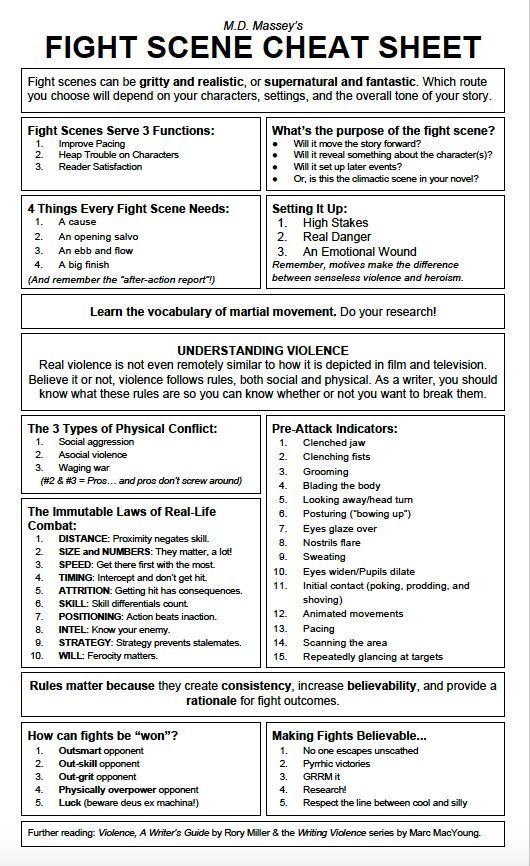
Writing tool for your fight scenes.
The “What-If” Writing Method
Sometimes when I’m writing, brain just....stops. No more ideas. No more words. Nothing. Sometimes, the solution to this problem is to simply take a break from writing and let your brain relax. Other times, though, you really are just at a block for ideas. This happened to me significantly more often than I would like, but thankfully, I’ve developed a solution that works well for me, and it’s uncreativly titled the “what-if” method.
Get a piece of paper and pen. Or a Google doc, or whatever works best for you.
Start brainstorming questions about your story, or possible “what-if” scenarios. (Ex: What if my character got framed for a crime they didn’t commit?)
Write down every single idea that comes to your head. Even if it doesn’t really work for your story. Even ones that deviate from your existing plot. Even the stupid ones. Especially the stupidest ones.
Cross out the ideas you don’t like, circle the ones that you do like.
Start coming up with answers for the questions you circled, or expand in the by coming up with more questions. (Ex: They would have to prove they didn’t commit the crime to regain their freedom. How do they prove it?)
Repeat until you have a full idea that you can work on/write with.
That’s it. That’s the whole strategy. I’ve used this a million times, and it’s gotten me out of a million cases of writers block, so hopefully it can work well for you too! Happy writing!
I hate to say this, and like, rain on everyone’s parade, but after scrolling past three posts about it on a writing tag …
If you are looking up synonyms to exchange words out in your story with the purpose of sounding smarter, more sophisticated, or complicated to your reader, you are probably abusing the thesaurus.
Now, if you *want* to do this, I mean, you can write whatever or however you want! But I just want you to know that this is frowned upon if you are trying to write at a professional level.
I have an old article on this somewhere …


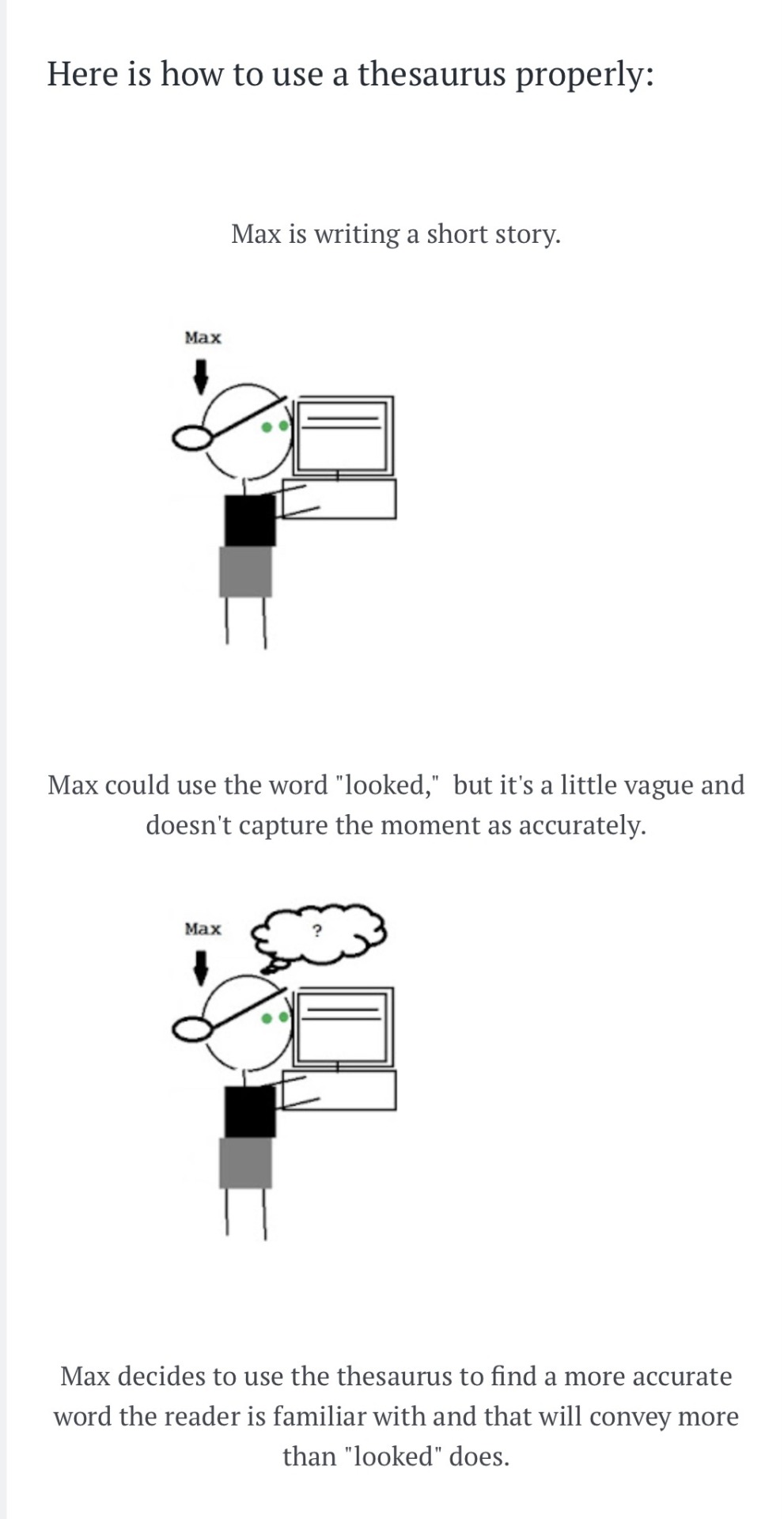
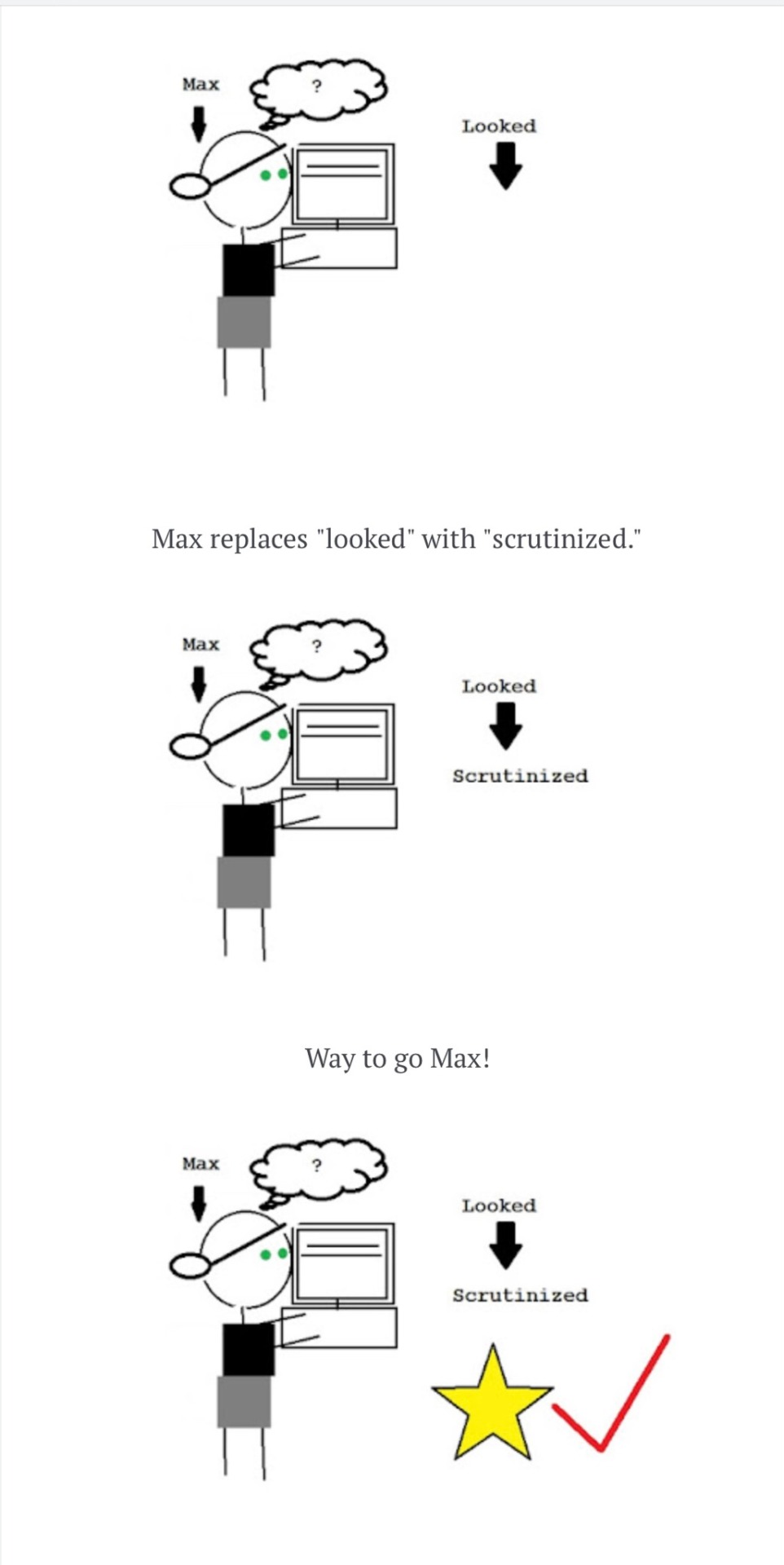
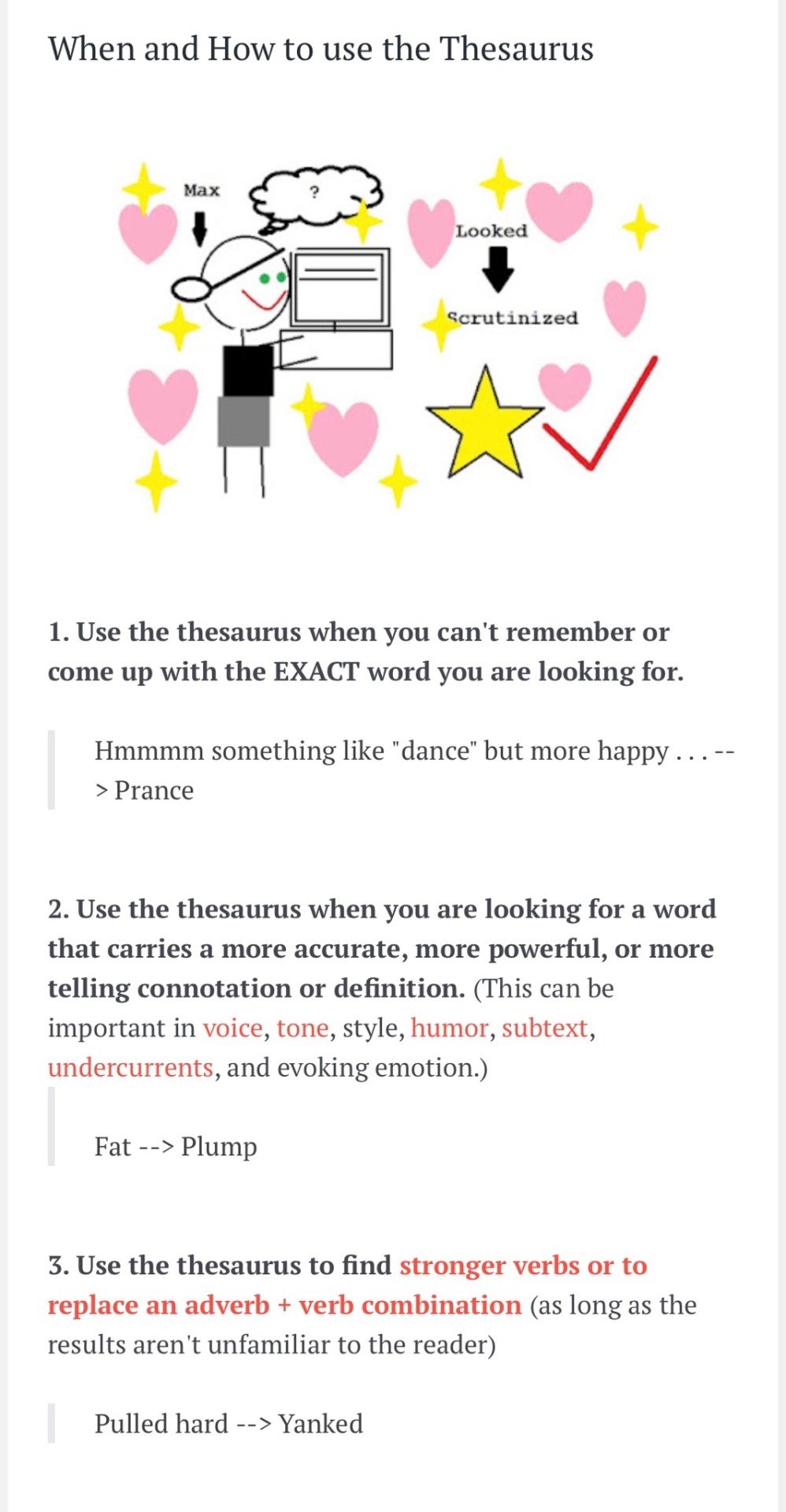

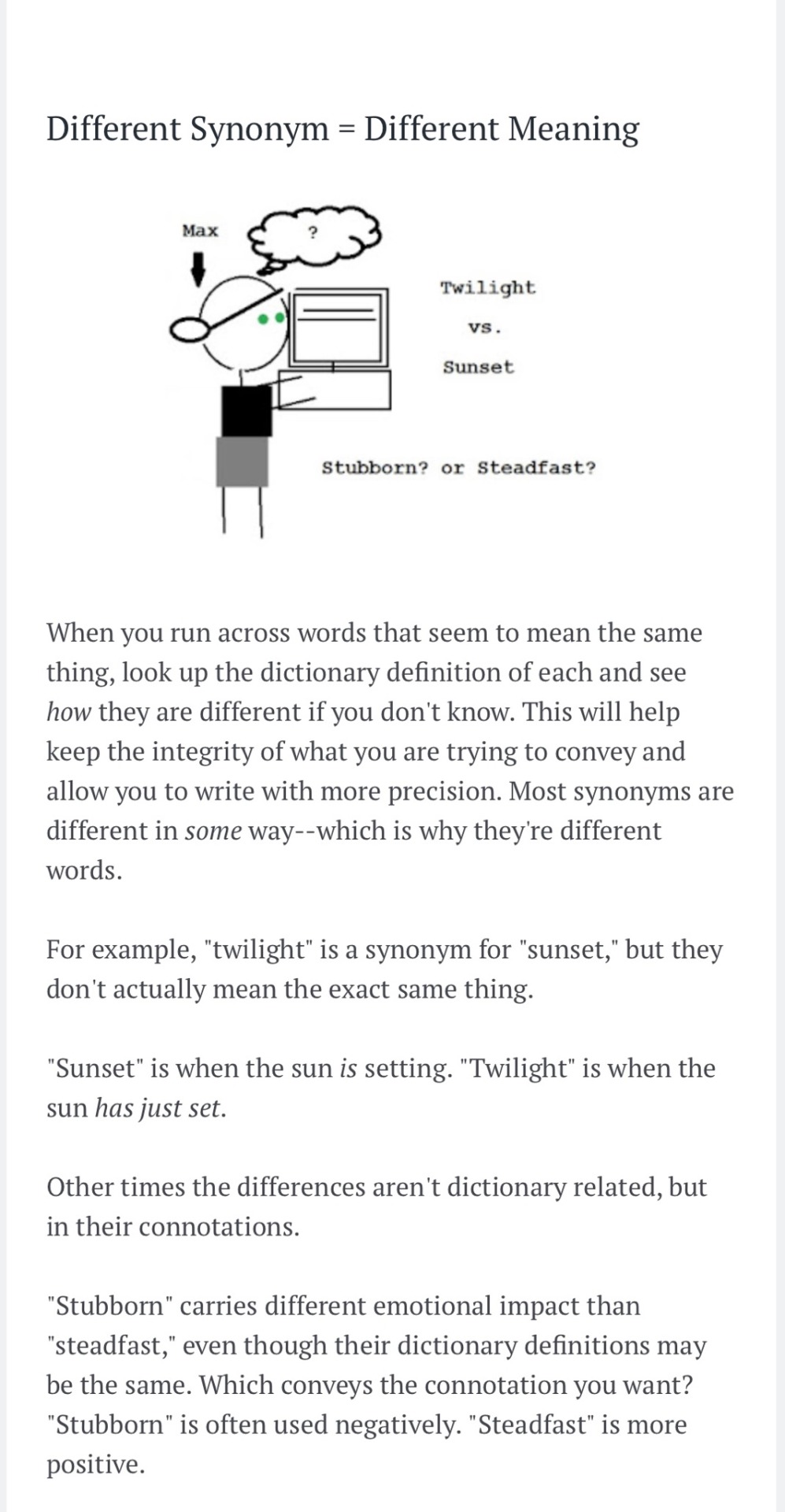
If you want to look at the original article…
https://www.septembercfawkes.com/2018/08/how-to-use-thesaurus-properly.html

-
 lightninginabottles-blog liked this · 1 month ago
lightninginabottles-blog liked this · 1 month ago -
 thyladyofathousand-n-onehobbies reblogged this · 3 months ago
thyladyofathousand-n-onehobbies reblogged this · 3 months ago -
 diamondrose015 liked this · 4 months ago
diamondrose015 liked this · 4 months ago -
 yoloveatsu reblogged this · 5 months ago
yoloveatsu reblogged this · 5 months ago -
 yoloveatsu liked this · 5 months ago
yoloveatsu liked this · 5 months ago -
 zairyn reblogged this · 9 months ago
zairyn reblogged this · 9 months ago -
 zairyn liked this · 9 months ago
zairyn liked this · 9 months ago -
 mlceleste liked this · 9 months ago
mlceleste liked this · 9 months ago -
 uhkayshuhmae liked this · 9 months ago
uhkayshuhmae liked this · 9 months ago -
 minstki liked this · 9 months ago
minstki liked this · 9 months ago -
 tibh-likes reblogged this · 10 months ago
tibh-likes reblogged this · 10 months ago -
 diving-fish reblogged this · 11 months ago
diving-fish reblogged this · 11 months ago -
 diving-fish liked this · 11 months ago
diving-fish liked this · 11 months ago -
 aimorker liked this · 11 months ago
aimorker liked this · 11 months ago -
 jaguarbitez liked this · 11 months ago
jaguarbitez liked this · 11 months ago -
 wiltei liked this · 1 year ago
wiltei liked this · 1 year ago -
 edgewatch reblogged this · 1 year ago
edgewatch reblogged this · 1 year ago -
 nightingalesighs liked this · 1 year ago
nightingalesighs liked this · 1 year ago -
 inmdreams liked this · 1 year ago
inmdreams liked this · 1 year ago -
 oktavia-blake liked this · 1 year ago
oktavia-blake liked this · 1 year ago -
 carpe-yeet-em reblogged this · 1 year ago
carpe-yeet-em reblogged this · 1 year ago -
 carpe-yeet-em liked this · 1 year ago
carpe-yeet-em liked this · 1 year ago -
 namelessscribe liked this · 1 year ago
namelessscribe liked this · 1 year ago -
 littlemissmedicalmalpractice liked this · 1 year ago
littlemissmedicalmalpractice liked this · 1 year ago -
 someoneknowmewell liked this · 1 year ago
someoneknowmewell liked this · 1 year ago -
 whumpy-daydreams liked this · 1 year ago
whumpy-daydreams liked this · 1 year ago -
 almaryllis liked this · 1 year ago
almaryllis liked this · 1 year ago -
 anggiie liked this · 1 year ago
anggiie liked this · 1 year ago -
 jeonghan-1004-angel liked this · 1 year ago
jeonghan-1004-angel liked this · 1 year ago -
 feliidaes liked this · 1 year ago
feliidaes liked this · 1 year ago -
 user26408000 liked this · 1 year ago
user26408000 liked this · 1 year ago -
 purplenightsworld liked this · 1 year ago
purplenightsworld liked this · 1 year ago -
 mallosoar liked this · 1 year ago
mallosoar liked this · 1 year ago -
 firlexgremlin liked this · 1 year ago
firlexgremlin liked this · 1 year ago -
 darksorcerer liked this · 1 year ago
darksorcerer liked this · 1 year ago -
 zoneeoftruthh liked this · 1 year ago
zoneeoftruthh liked this · 1 year ago -
 bluenazair reblogged this · 1 year ago
bluenazair reblogged this · 1 year ago -
 carlsdraws reblogged this · 1 year ago
carlsdraws reblogged this · 1 year ago -
 xcrimsonfright liked this · 1 year ago
xcrimsonfright liked this · 1 year ago -
 saccharine-azure liked this · 1 year ago
saccharine-azure liked this · 1 year ago -
 chronicbookworm liked this · 1 year ago
chronicbookworm liked this · 1 year ago -
 mss3ng liked this · 1 year ago
mss3ng liked this · 1 year ago -
 bivaxual liked this · 1 year ago
bivaxual liked this · 1 year ago -
 romanaisalive liked this · 1 year ago
romanaisalive liked this · 1 year ago -
 evaceratops reblogged this · 1 year ago
evaceratops reblogged this · 1 year ago -
 siaglobfoli liked this · 1 year ago
siaglobfoli liked this · 1 year ago -
 tflow333 liked this · 1 year ago
tflow333 liked this · 1 year ago -
 theseverystars reblogged this · 1 year ago
theseverystars reblogged this · 1 year ago -
 theseverystars liked this · 1 year ago
theseverystars liked this · 1 year ago
